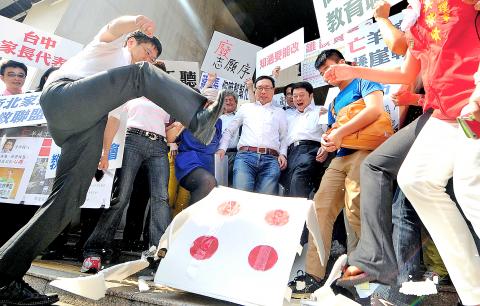Minister of Education Chiang Wei-ling (蔣偉寧) yesterday said he was taking full responsibility for the public confusion over the recently held examinations for junior-high school students, but added that the important task at hand would be helping students pick a school rather than finger-pointing.
The ultimate goal of the Comprehensive Assessment Program, held last week across the country, is to implement standardized examinations and boost the number of examination-free slots for students to be admitted into schools.
The maximum score for the program is 90 points, with the “school preference section” taking up 30 points, general examination scores 30 points and extracurricular activities the remaining 30 points.

Photo: Liao Chen-huei, Taipei Times
Based on the program, the general examination scores are mainly divided into three tiers (exceptional, normal and unsatisfactory), which are further divided into four ranking levels from “A++” to “C,” while the essay composition section has a separate ranking structure.
In the event of more students applying than the number of available slots at a particular school, priority is given to essay composition scores. Comparison using ranking levels is only used when there are still more students than the number of allotted slots after the initial process of comparison is completed.
However, parents and students from Keelung, Taipei and New Taipei City areas have complained about the heavy weight given to essay composition, which they say make it more difficult for students who have obtained good grades but average composition scores to be admitted to top schools.
They also demanded that the ministry explain reports that the Greater Kaohsiung area used comparison by ranking levels ahead of essay composition scores.
Taipei City Department of Education director Lin Yi-hua (林弈華) echoed the parents’ concerns, saying the ministry must give the public an explanation, as other townships and cities, including Hsinchu County, Miaoli County, Taitung County and the Greater Taichung-Nantou area, had adhered to the procedures outlined in the program.
Due to the public outcry, a Control Yuan committee said it might consider launching an investigation.
The essay composition scores becoming the crux of whether a student could enter one of the “star high schools” needs to be addressed by the Ministry of Education, the committee said.
Chiang said the central government would do its best to negotiate with the local governments and minimize problems for students, but now is not the time for finger-pointing.
“You have my word” that after the problems are dealt with, there will be a reckoning, Chiang said.
Meanwhile, education organizations called on the ministry to implement the spirit of the 12-year standard education program — to allow all students to attend school without taking examinations — and not to be hijacked by elitist parents and “star schools.”
The ministry should have learned its lesson and made adjustments where needed to exempt students from unnecessary examinations, said Gordon Hsieh (謝國清), chief executive of the National Alliance of Parents Organization’s 12-year compulsory education office.
Humanistic Education Foundation executive director Joanna Feng (馮喬蘭) said resources for high schools and vocational high schools must be equalized to increase educational opportunities for young people.
Ensuring a sufficient number of student admission slots for each area will ease parental anxiety and protect children’s right to education, Feng said.

Alain Robert, known as the "French Spider-Man," praised Alex Honnold as exceptionally well-prepared after the US climber completed a free solo ascent of Taipei 101 yesterday. Robert said Honnold's ascent of the 508m-tall skyscraper in just more than one-and-a-half hours without using safety ropes or equipment was a remarkable achievement. "This is my life," he said in an interview conducted in French, adding that he liked the feeling of being "on the edge of danger." The 63-year-old Frenchman climbed Taipei 101 using ropes in December 2004, taking about four hours to reach the top. On a one-to-10 scale of difficulty, Robert said Taipei 101

A preclearance service to facilitate entry for people traveling to select airports in Japan would be available from Thursday next week to Feb. 25 at Taiwan Taoyuan International Airport, Taoyuan International Airport Corp (TIAC) said on Tuesday. The service was first made available to Taiwanese travelers throughout the winter vacation of 2024 and during the Lunar New Year holiday. In addition to flights to the Japanese cities of Hakodate, Asahikawa, Akita, Sendai, Niigata, Okayama, Takamatsu, Kumamoto and Kagoshima, the service would be available to travelers to Kobe and Oita. The service can be accessed by passengers of 15 flight routes operated by

Taiwanese and US defense groups are collaborating to introduce deployable, semi-autonomous manufacturing systems for drones and components in a boost to the nation’s supply chain resilience. Taiwan’s G-Tech Optroelectronics Corp subsidiary GTOC and the US’ Aerkomm Inc on Friday announced an agreement with fellow US-based Firestorm Lab to adopt the latter’s xCell, a technology featuring 3D printers fitted in 6.1m container units. The systems enable aerial platforms and parts to be produced in high volumes from dispersed nodes capable of rapid redeployment, to minimize the risk of enemy strikes and to meet field requirements, they said. Firestorm chief technology officer Ian Muceus said

MORE FALL: An investigation into one of Xi’s key cronies, part of a broader ‘anti-corruption’ drive, indicates that he might have a deep distrust in the military, an expert said China’s latest military purge underscores systemic risks in its shift from collective leadership to sole rule under Chinese President Xi Jinping (習近平), and could disrupt its chain of command and military capabilities, a national security official said yesterday. If decisionmaking within the Chinese Communist Party has become “irrational” under one-man rule, the Taiwan Strait and the regional situation must be approached with extreme caution, given unforeseen risks, they added. The anonymous official made the remarks as China’s Central Military Commission Vice Chairman Zhang Youxia (張又俠) and Joint Staff Department Chief of Staff Liu Zhenli (劉振立) were reportedly being investigated for suspected “serious